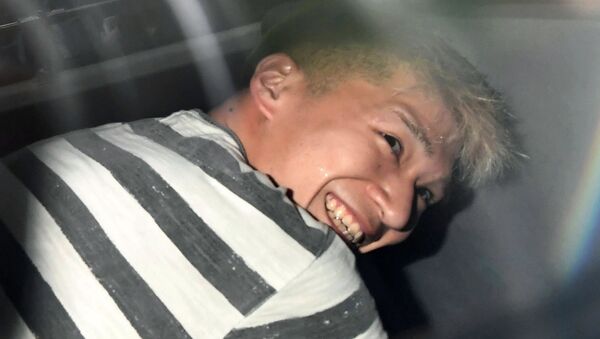Satoshi Uematsu, his face concealed by a blue jacket while being transported from a Sagamihara police station about 30 miles southwest of Tokyo on Wednesday, flashed a toothy grin at television cameras from the unmarked van.
News cameras and reporters watched as six officers raided Uematsu’s house. The Kyodo news agency reports that the killer told investigators that a desire to “save” people with critical disabilities is what motivated his attack.
Few details about the stabbings have been released, with some wondering why the home did not have adequate security and surveillance to prevent such occurrences.
Staff at the home first contacted police at 2:30 AM local time on Tuesday morning (17:30 PM GMT Monday), reporting a man near the grounds at Tsukui Yamayuri Garden, dressed in black and wielding a knife. Uematsu tied up two employees and proceeded to stab residents as they lay in bed. Some 40 minutes later nine men and ten women, between the ages of 19 and 70 were dead, most with their throats cut.
Tatsuhisa Hirosue, an official in the Kanagawa prefecture welfare division, said that the surviving staff, "were working at night and were questioned by police after witnessing graphic violence, which has made them a little emotionally unstable."
Earlier reports have Uematsu confessing to authorities that he wanted to "rid the world of disabled people." In February the killer hand-delivered a letter to the Japanese parliament calling for disabled people to be euthanised. He reportedly said disabled people should lose their lives in "a world that allows mercy killing."
He was later committed to a psychiatric hospital where he expressed his desire to kill disabled people. He was released 12 days later, after doctors claimed that he posed no risk to himself or others. That prognosis has, predictably, drawn sharp criticism.
An editorial in the Asahi Shimbun newspaper read, "Involuntary commitment is done forcefully by the authorities … If the time period drags on longer than necessary, it becomes a serious violation of human rights…However, there were warning signs before this incident. Was the treatment and [monitoring] of the man sufficient? It is vital to closely examine the system of support for the man and his family, and the contacts between the medical system and the police."
The newspaper called Uematsu’s release "appalling" and said homes for the disabled should beef up their security. "It is a matter of great regret for society that such a serious stabbing incident was allowed to happen," the editorial stated.
The victim’s identities have not been released.





